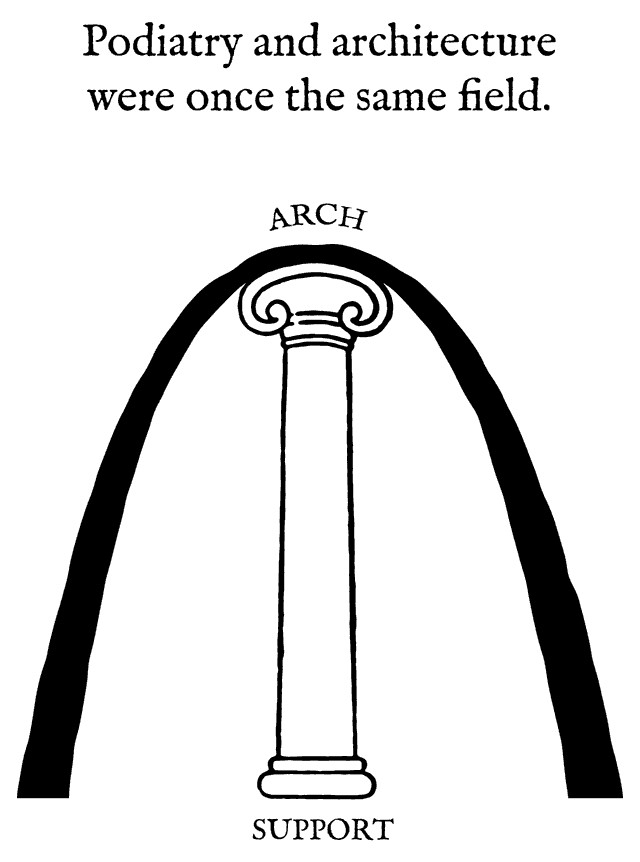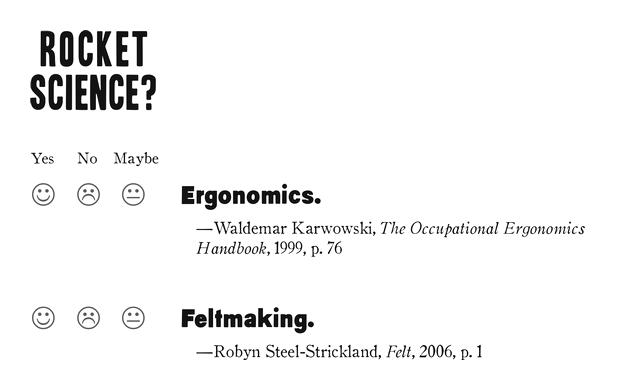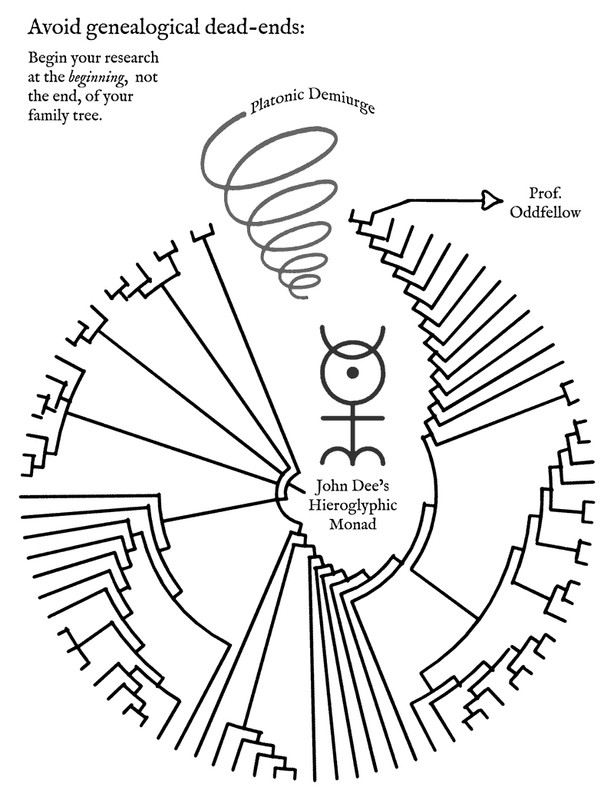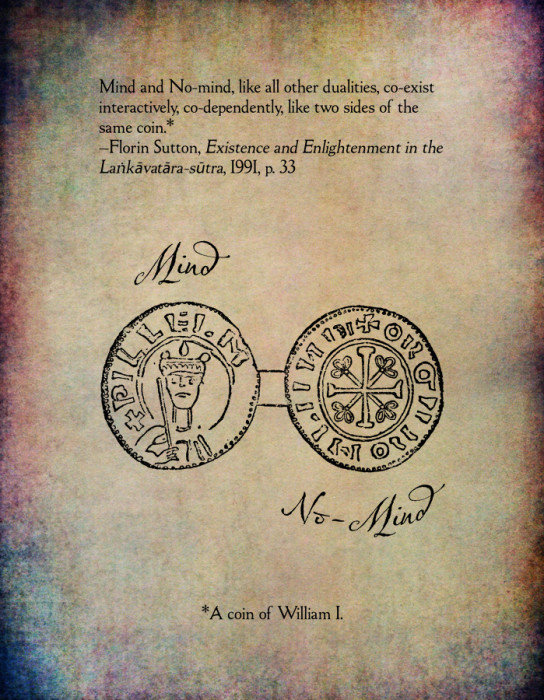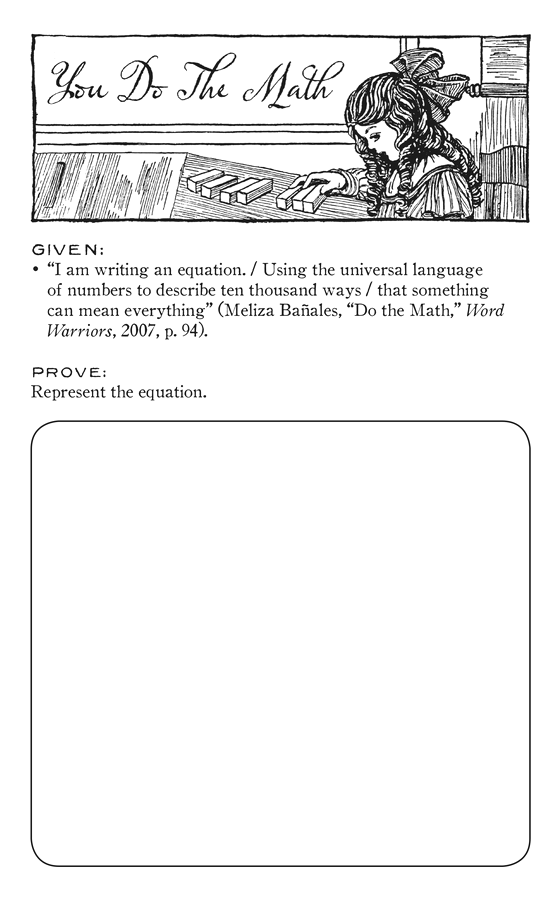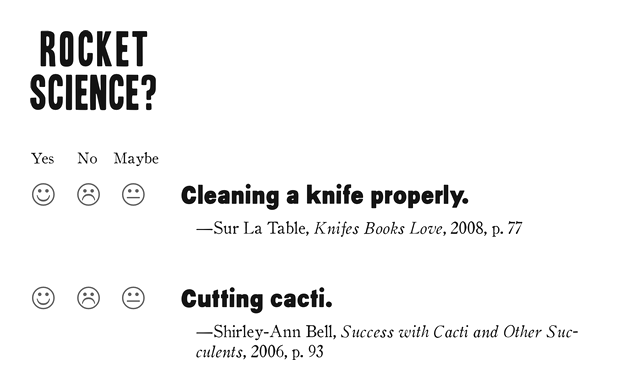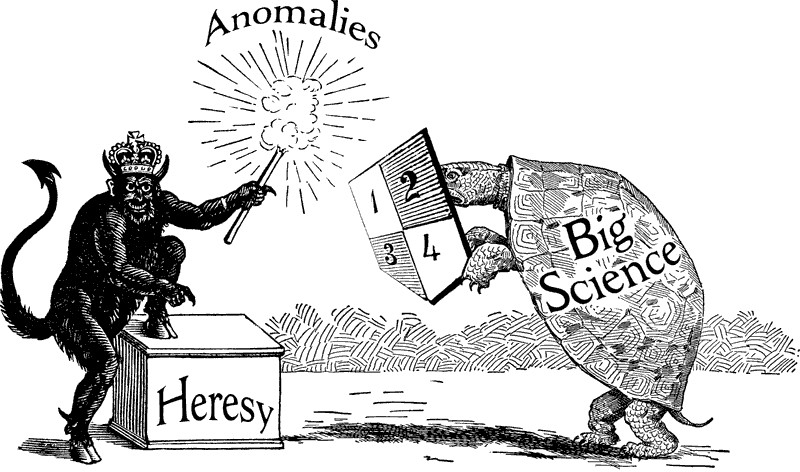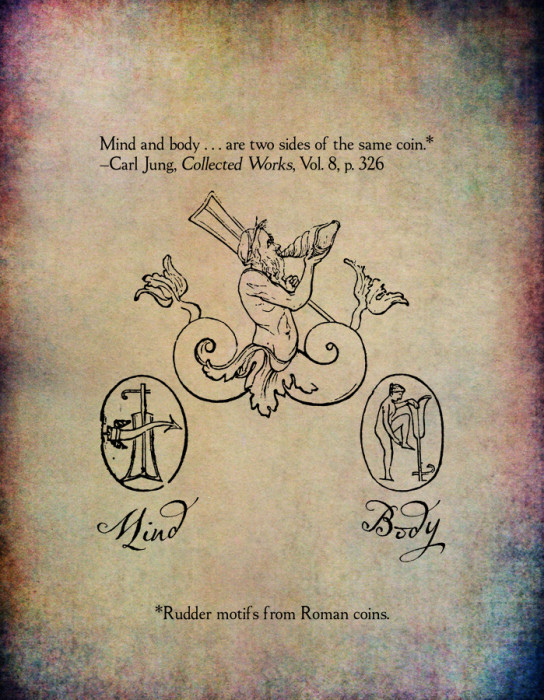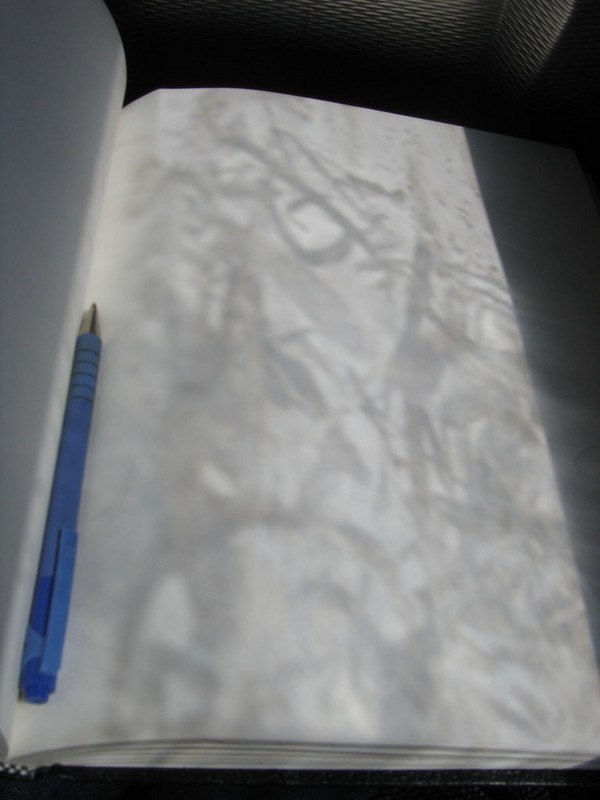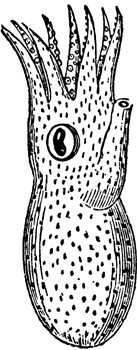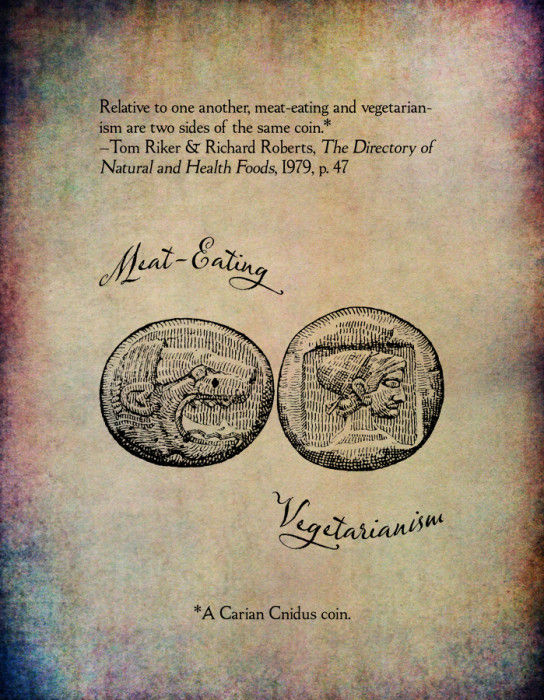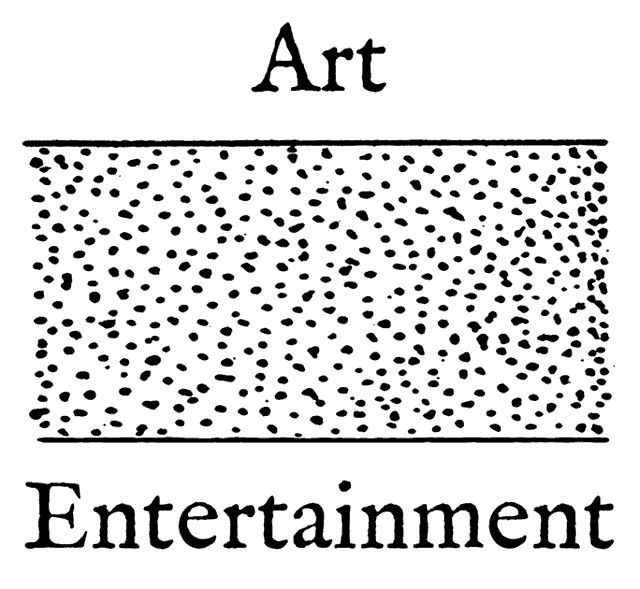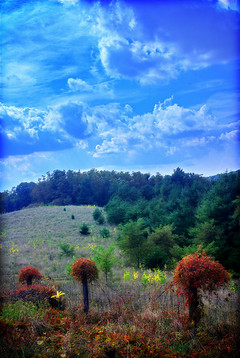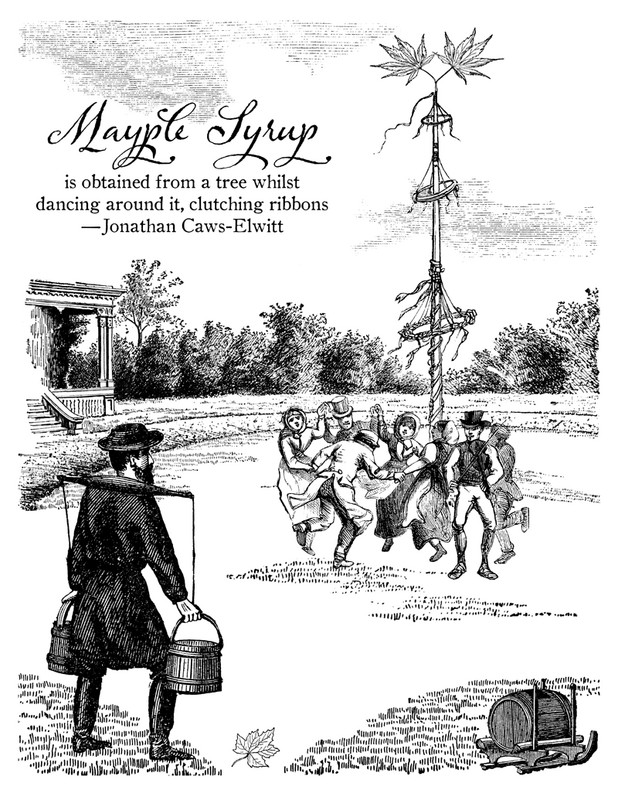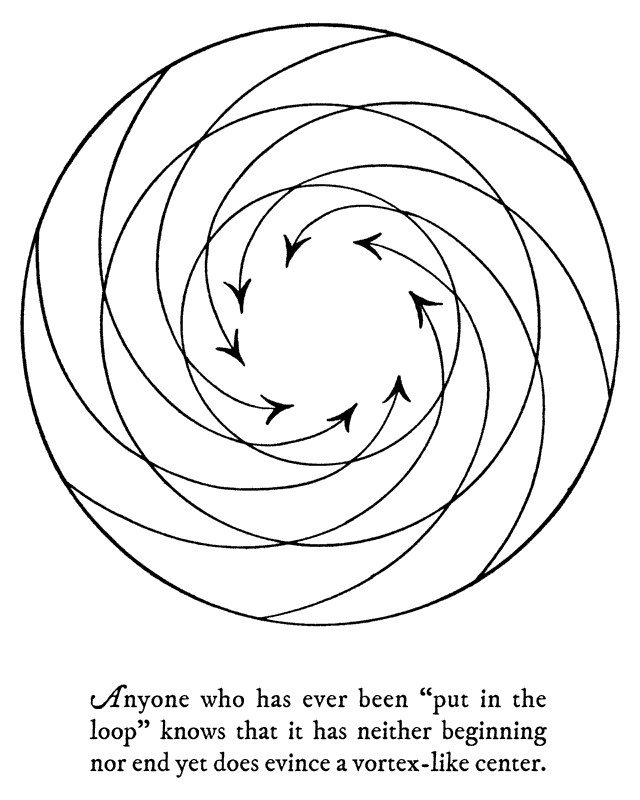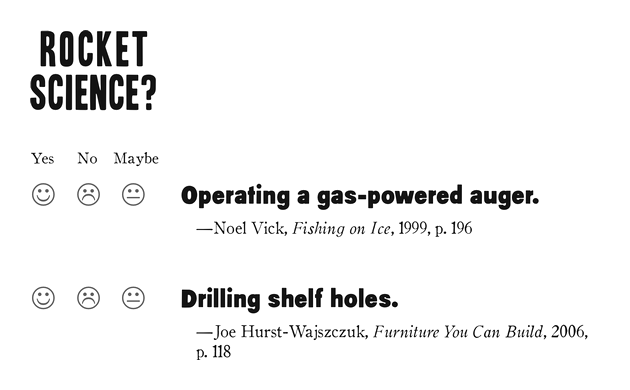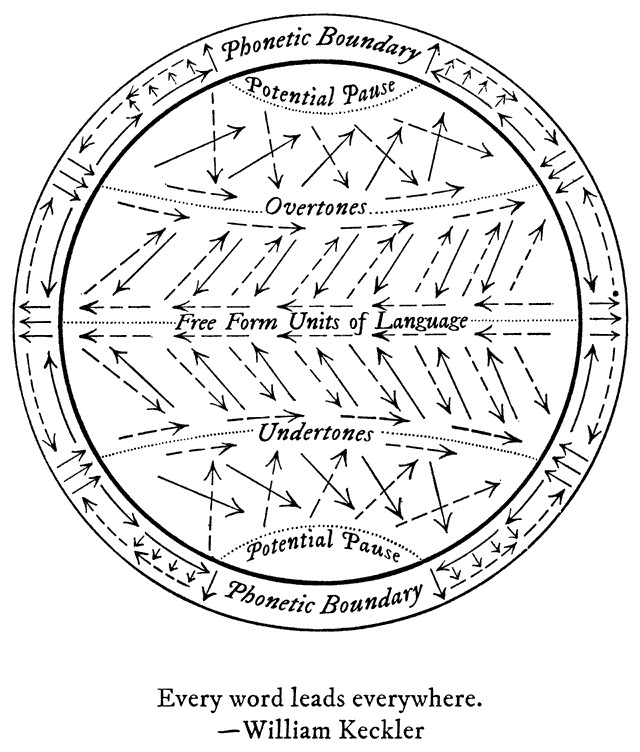
 |
| Puzzles and Games :: Which is Funnier |
(permalink) |
 |
 |
 |
 Which Shakespeare play is funnier: Hamlet or A Midsummer Night’s Dream
Clue: Which Shakespeare play is funnier: Hamlet or A Midsummer Night’s Dream
Clue: This is according to a user’s guide to Hamlet
Answer: A Midsummer Night’s Dream (The answer is in black text on the black background. Highlight it to view.)
Citation: Michael Pennington, Hamlet: A User’s Guide (1997), p. 18.
|


 |
LAST QUARTER (CONTINUOUS)"Eventide — An indefinite period." —Thomas B Neely, The Illustrative Lesson Notes (1894)
|


 |
 Is it true, as Momus
suggests, that there are "few tales which would not be improved by the
addition of the phrase 'suddenly, a shot rang out'"? Decide for
yourself as we alter the opening lines of . . . THUS SPAKE ZARATHUSTRA by Friedrich NietzscheWhen Zarathustra was thirty years old, he left his home and the lake of his home, and went into the mountains. There he enjoyed his spirit and solitude, and for ten years did not weary of it. But at last his heart changed,—and rising one morning with the rosy dawn, he went before the sun. Suddenly, a shot rang out.
|

 |
|
|
 |
 |
From Prof. Oddfellow's sketchbook:
 |
Printed collections of Forgotten Wisdom diagrams are available: Volume I from Mindful Greetings and Volumes II, III and IV from Amazon. Selected posters are also available via Zazzle. |
|

 |
INSTRUCTIONS: Click on the puzzle image below to reveal one possible solution.
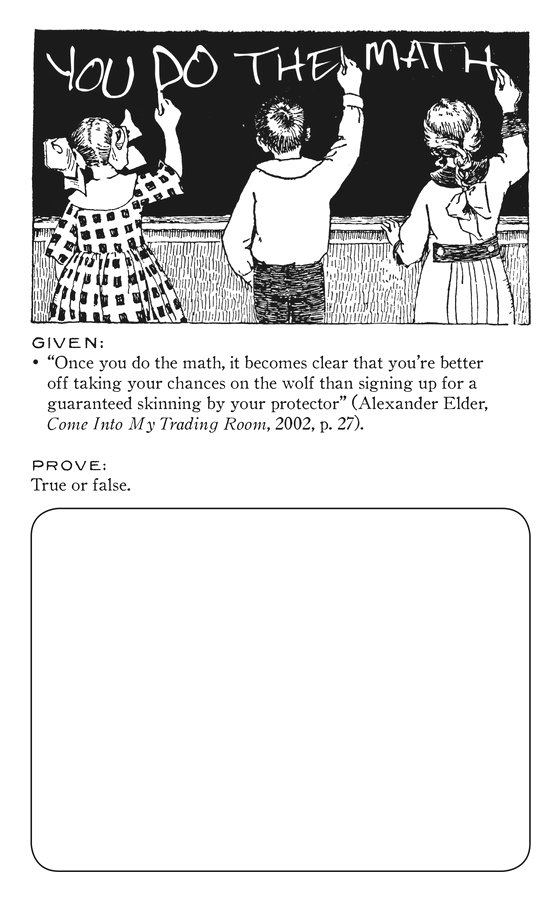
|


 |
Yes, you may . . . on one condition:
"You must promise me a favour in return." —C. N. Williamson, "The Adventure of Monica," 1905
|




 |
“Your boat must be three quarters of a mile away.” —Herbert Warren Wind
|


 |
|

 |
|
|
 |
 |
From Prof. Oddfellow's sketchbook: This item was inspired by Cynthia Ozick's amazing blurb for Frederic Tuten's Self Portraits: Fictions: "An amazing, glittering, glowing, Proustian, Conradian, Borgesian, diamond-faceted, language-studded, myth-drowned dream!"

Barely Able writes: I loved this blurb flow chart. It reminds me of the paint swatches at WAL-MART, which are probably the most perfect thing in the store. Which makes me want to destroy them. Or rearrange their perfect order. This is a Luciferian impulse. Did Lucifer really want to destroy? Or did he want to merely re-arrange. En tout cas, it's clear that re-arrangement is a damnable offense. A primordial offense. Perhaps the Ur-Offense. What is literary criticism but an attempt to rearrange artistic works in an imaginary space. It's hilarious. The books stay right where they are put. But if the re-arranger is particularly successful he might have certain books banned or sent to book gulags (thrift stores or worse). In which case, the books find it hard to reproduce. And then they may go extinct. So, overall, I think God is right. He should destroy Satan for being the Great Interior Decorator that he so clearly is. Satan is all about fussiness. There is no sin that does not first begin in fussiness.
 |
|
|

 |
Above, Mike is caught staring at the sunset over Moel y Gest mountain in Wales.
Below, the photo Mike took.
|

 |
LAST QUARTEROne-half of the semicolon appears to be illuminated by the reading lamp. The fraction of the semicolon's dot that is illuminated is decreasing, like the sound of waves during low tide. This semicolon is sometimes called Third Quarter. The left half of the semicolon appears lighted, and the right side appears dark. During the time between the Full Semicolon and the Last Quarter Semicolon, the part of the semicolon that appears lighted gets smaller and smaller every day, like a healing wound. It will continue to shrink until the New Semicolon.
|


 |
 Is it true, as Momus
suggests, that there are "few tales which would not be improved by the
addition of the phrase 'suddenly, a shot rang out'"? Decide for
yourself as we alter the opening lines of . . . WALDEN by Henry David ThoreauWhen I wrote the following pages, or rather the bulk of them, I lived alone, in the woods, a mile from any neighbor, in a house which I had built myself, on the shore of Walden Pond, in Concord, Massachusetts, and earned my living by the labor of my hands only. I lived there two years and two months. At present I am a sojourner in civilized life again. Suddenly, a shot rings out.
|


 |
| Puzzles and Games :: Which is Funnier |
(permalink) |
 |
 |
 |
 Which word is funnier: car or Buick?
Clue: Which word is funnier: car or Buick?
Clue: This is according to the book Drawing on the Funny Side of the Brain
Answer: Buick, as it is “funny sounding and more specific.” (The answer is in black text on the black background. Highlight it to view.)
Citation: Christopher Hart, Drawing on the Funny Side of the Brain (1998), p. 107
|

 |
|
|
 |
 |
From Prof. Oddfellow's sketchbook:
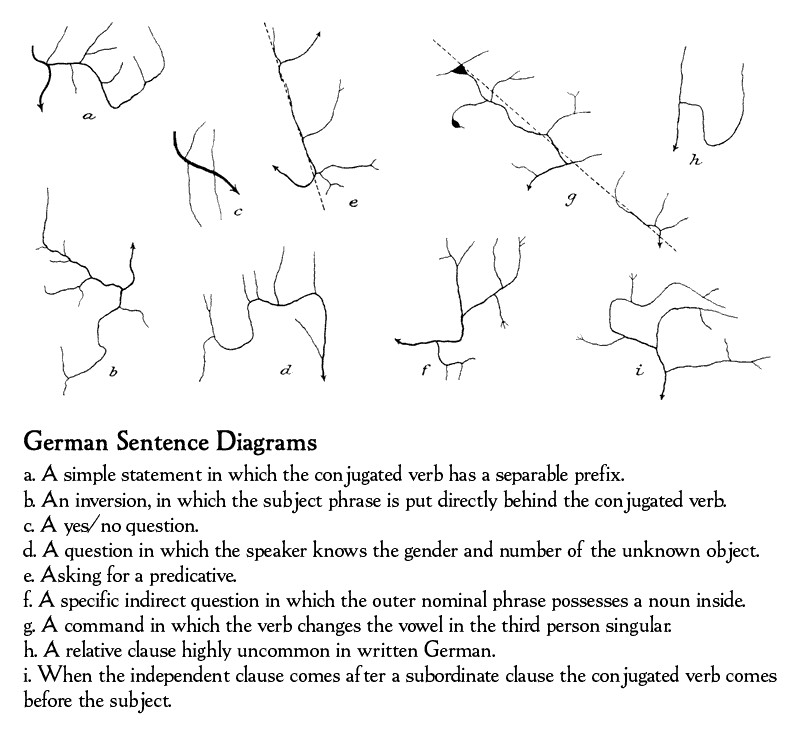
J adds:
j. An axon and dendrite dressed up as a German sentence for Halloween.
|


 |
|
|
 |
 |
 Is it true, as Momus
suggests, that there are "few tales which would not be improved by the
addition of the phrase 'suddenly, a shot rang out'"? Decide for
yourself as we alter the opening lines of . . . BUDDHA by Karen ArmstrongOne night toward the end of the sixth century B.C.E., a young man called Siddhatta Gotama walked out of his comfortable home in Kapilavatthu in the foothills of the Himalayas and took to the road. Suddenly, a shot rang out. [Thanks to June for suggesting this send-up of the old saying, "If you see the Buddha on the road, kill him."]
|



 |
| The Ghost in the [Scanning] Machine |
(permalink) |
 |
 |
 |
~ Mysterious Beards ~ 
Portrait from Autobiography of Enrico Morozzo della Rocca.
“Nebulous and gruesome shreds of blue-fog like wraiths.” —Frederick Albert Cook
|

 |
 “Keep a tight lid on the boat, and your ship will come in.” —James Van Pelt “Keep a tight lid on the boat, and your ship will come in.” —James Van Pelt
|



 |
|
|
 |
 |
LAST QUARTER (PROGRESSIVE)"The period of moonlight falls in the first part of the night." —Alfred Reginald Radcliffe-Brown, The Andaman Islanders (1948)
|

 |
| Puzzles and Games :: Which is Funnier |
(permalink) |
 |
 |
 |
 Which word is funnier: fat or bloated?
Clue: Which word is funnier: fat or bloated?
Clue: This is according to the book Drawing on the Funny Side of the Brain
Answer: Bloated, as it is “slightly gross.” (The answer is in black text on the black background. Highlight it to view.)
Citation: Christopher Hart, Drawing on the Funny Side of the Brain (1998), p. 107
|


 |
 Is it true, as Momus
suggests, that there are "few tales which would not be improved by the
addition of the phrase 'suddenly, a shot rang out'"? Decide for
yourself as we alter the opening lines of . . . WUTHERING HEIGHTS by Emily Brontë I have just returned from a visit to my landlord—the solitary neighbour that I shall be troubled with. This is certainly a beautiful country! In all England, I do not believe that I could have fixed on a situation so completely removed from the stir of society. A perfect misanthropist’s heaven: and Mr. Heathcliff and I are such a suitable pair to divide the desolation between us. A capital fellow! He little imagined how my heart warmed towards him when I beheld his black eyes withdraw so suspiciously under their brows, as I rode up, and when his fingers sheltered themselves, with a jealous resolution, still further in his waistcoat, as I announced my name. Suddenly, a shot rang out.
|

 |
|
|
 |
 |
Linear time reversed itself as the Belgian new wave band Neon Judgement remastered their first two cassettes and released them on vinyl LPs. Why they skipped 8-tracks along the way to vinyl, we'll never know, but we're eagerly awaiting a cylinder phonograph release, presumably available in time for holiday shopping. |

 |
Prof. Oddfellow experiences a brainstorm below Portmeirion's folly lighthouse as the sun sets behind Moel y Gest mountain. |

 |
INSTRUCTIONS: Click on the puzzle image below to reveal one possible solution.
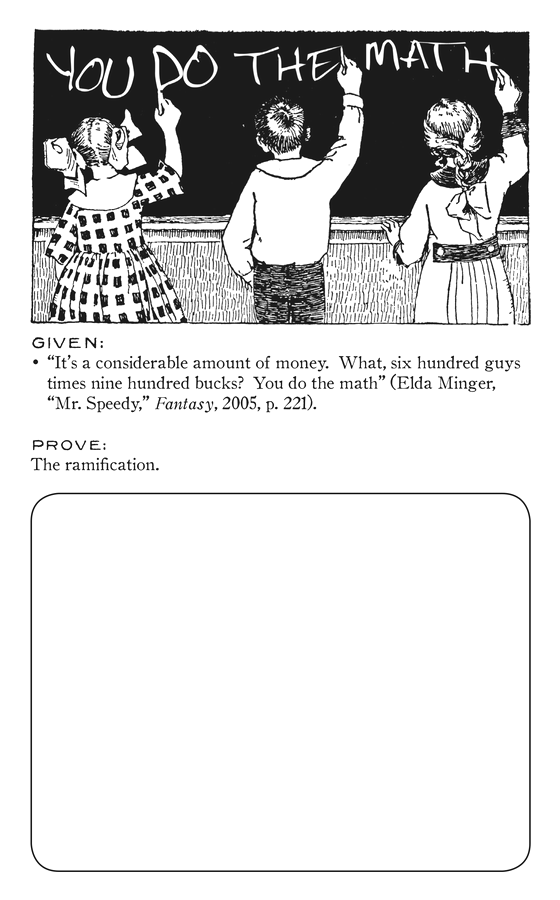
|



 |
|
|
 |
 |
| I Found a Penny Today, So Here's a Thought |
(permalink) |
 |
 |
 |
" Every science is a mutilated octopus. If its tentacles were not clipped to stumps, it would feel its way into disturbing contacts. To a believer, the effect of the contemplation of a science is of being in the presence of the good, the true, and the beautiful. But what he is awed by is Mutilation. To our crippled intellects, only the maimed is what what we call understandable, because the unclipped ramifies away into all other things." —Charles Fort ( Wild Talents), on every science's propensity to dismiss anything that doesn't fit its dogma |



 |
 “Your ship will come back to you laden with all the precious, divine gifts.” —Annalee Skarin “Your ship will come back to you laden with all the precious, divine gifts.” —Annalee Skarin
|


 |
|
|
 |
 |
Our 14th great-grandmother, Mary Sidney, Countess of Pembroke, has many distinctions, not the least of which is her likelihood of having written the Shakespeare plays and sonnets. (For compelling evidence, see Sweet Swan of Avon: Did a Woman Write Shakespeare?) In this photo, we embrace our literary heritage. The purple shirt and magic wand are in honor of the Irish branch of the family, which traces back to mytho-historical High Kings and fairy folk.

--- E West writes: Love the shirt!
That's a wand? Quite wonderful!
A Riverside Shakespeare? Are you near the Charles River?
"Sweet Swan of Avon: did a woman write Shakespeare?" -- oh, very sweet, indeed! Bravo!
--- Prof. Oddfellow writes: Thank you! The purple shirt reflects the hefty
responsibility that comes with owning one’s exalted heritage. When one's ancestors are of royal
and/or magical origin, some rather profound questions
and challenges suggest themselves. To what crown(ing
glory) is one the natural successor?
To what dignities? What
traditions are one's responsibility to keep alive? What untapped powers?
If one's Weltanschauung does not account for an Otherworld, how can one
reconcile one's nymph-glands? ;-) The Riverside Shakespeare was my favorite text from graduate school. (It's the book I referenced while composing this rarefied research.) I'm not near the Charles River, though I understand it's quite lovely.
|

 |
| Someone Should Write a Book on ... |
(permalink) |
 |
 |
 |
"If somebody should like to write a book, but is like millions of persons who would like to write books, but fortunately don't know just what to write books about, I suggest a study of scares, with the idea of showing that they were not altogether hysteria and mass psychology, and that there may have been something to be scared about." —Charles Fort, Wild Talents (1932) |



 |
LAST QUARTER (FUTURE)"As if to punctuate the point, divine shafts of moonlight stream down." —Mark I. Pinsky, The Gospel According to Disney (2004)
|

 |
This bright and cheerful September afternoon, with the strong greens and browns all around him and the ethereal, gentle misted tones of blue verging into violet in the distance.
—Hermann Hesse, The Glass Bead Game, translated by Richard and Clara Winston
 |
* Though printed in black and white, great literature is bursting with vibrant colour. In this rebus-style puzzle, color words and parts of words have been replaced with colored boxes. Try to guess the exact hue of each. Roll your mouse over the colored boxes to reveal the missing words. Click the colored boxes to learn more about each hue. Special thanks to Paul Dean for his colorful research.
|
|


 |
From Prof. Oddfellow's sketchbook:
|

 |
|
|
 |
 |
From Prof. Oddfellow's sketchbook:
 |
Printed collections of Forgotten Wisdom diagrams are available: Volume I from Mindful Greetings and Volumes II, III and IV from Amazon. Selected posters are also available via Zazzle. |
|

 |
INSTRUCTIONS: Click on the puzzle image below to reveal one possible solution.
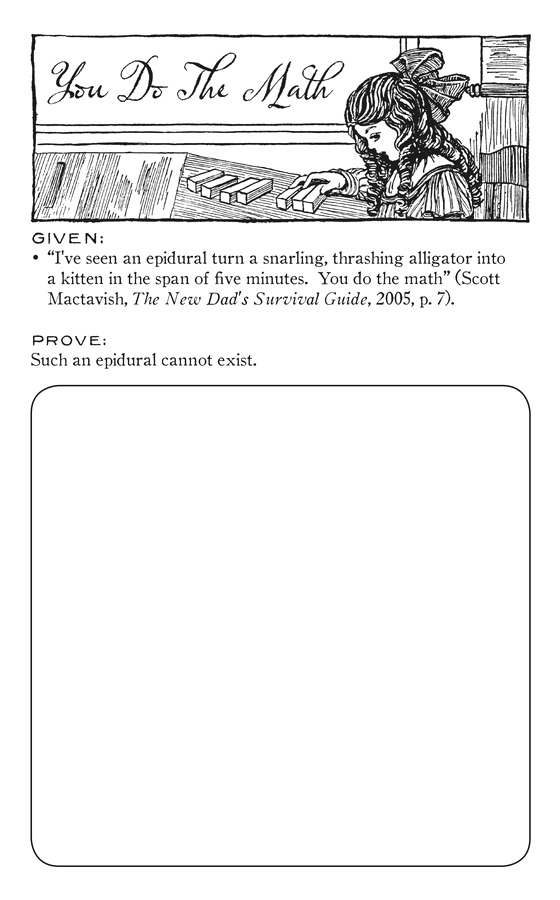
|

 |
|
|
 |
 |
Charles Fort explains his eerily marvelous theory that ours is a ghostly realm—that when spirits die they become human beings: My suspicion is that we've got everything reversed; or that all things that have the sanction of scientists, or that are in agreement with their myths, are ghosts: and that things called 'ghosts,' are, because they are not in agreement with the spooks of science, the more nearly real things. I now suspect that the spiritualists are reversedly right—that there is a ghost-world—but that it is our existence—that when spirits die they become human beings. I now have a theory that once upon a time, we were real and alive, but departed into this state that we call 'existence'—that we have carried over with us from the real existence, from which we died, the ideas of Truth, and of axioms and principles and generalizations—ideas that really meant something when we were really alive, but that, of course, now, in our phantom-existence—which is demonstrable by any X-ray photograph of any of us—can have only phantom-meaning—so then our never-ending, but always frustrated, search for our lost reality. We come up chimera and mystification, but persistently have beliefs, as retentions from an experience in which there were things to believe in. I'd not say that all of us are directly ghosts: most of us may be the descendants of the departed from a real existence, who, in our spook-world, pseudo-propagated. ( Wild Talents, 1932) |

 |
| Puzzles and Games :: Which is Funnier |
(permalink) |
 |
 |
 |
 What’s funnier than death?
Clue: What’s funnier than death?
Clue: This is according to a novel entitled A Stranger in My Grave
Answer: Nothing. “There's nothing funnier than death, really, especially if you have an advanced sense of humor.” (The answer is in black text on the black background. Highlight it to view.)
Citation: Margaret Millar, A Stranger in My Grave (1960), p. 11
|

 |
|
|
 |
 |
Do blurbs sell books? With a blurb like this one, how could Prof. Oddfellow refuse? "An amazing, glittering, glowing, Proustian, Conradian, Borgesian, diamond-faceted, language-studded, myth-drowned dream!" — Cynthia Ozick, describing this book(That's Prof. Oddfellow's catnip mouse enjoying the Swiss cheese on the dust jacket. Thanks in a roundabout way to Hilary's mom for the tip!) |




 |
 “Your ship will come in! We’ll celebrate tonight.” —Edward Michel-Bird “Your ship will come in! We’ll celebrate tonight.” —Edward Michel-Bird
|

 |
|
|
 |
 |
We're honored to have captured the spirit of Brentwood for DGuides' resource on the greater Los Angeles area. Our photo shows the hilltop Getty Museum from the Angeleno Hotel. |

 |
From Prof. Oddfellow's sketchbook:
|


 |
|
|
 |
 |
 Is it true, as Momus
suggests, that there are "few tales which would not be improved by the
addition of the phrase 'suddenly, a shot rang out'"? Decide for
yourself as we alter the opening lines of . . . GREAT EXPECTATIONS by Charles Dickens My father's family name being Pirrip, and my Christian name Philip, my infant tongue could make of both names nothing longer or more explicit than Pip. So, I called myself Pip, and came to be called Pip. Suddenly, a shot rang out.
|

 |
WANING GIBBOUS (PRESENT PERFECT)"The moonlight punctuating the wave crests." —Maxine Masterfield, Painting the Spirit of Nature (1996)
|

Page 0 of 4044


Original Content Copyright © 2026 by Craig Conley. All rights reserved.
|



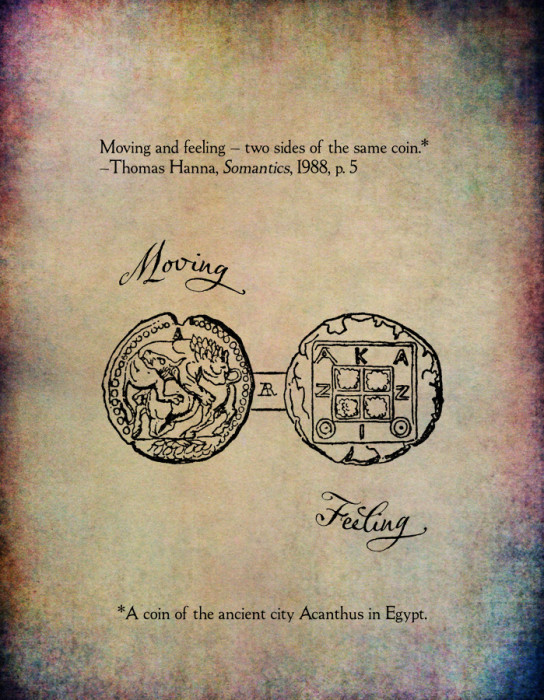




 Is it true, as
Is it true, as 